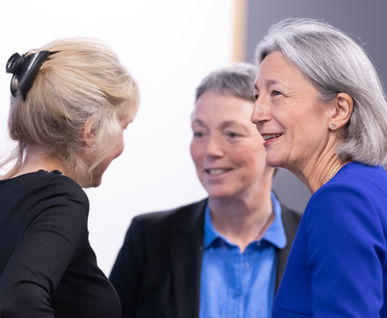On life, learning and leadership by Dame Clare Marx
Published: 18 October 2019
Our Athena SWAN series of guest lectures have opened up conversation in St George’s about gender equality and representation in higher education. We have heard from inspirational speakers from a variety of fields, speaking about progression, leadership and success for all.
The most recent talk, by Dame Clare Marx, Chair of the General Medical Council (GMC), offered food for thought on overcoming institutional barriers for those pursuing a career in medicine.
Wearing a green ribbon, in support of the right for everyone to speak freely, Clare set the tone for a frank and insightful talk on her life and career.
Learning from experience
The daughter of an industrial research chemist and children’s social worker/teacher, Clare first studied medicine at University College London, before returning to her hometown of Coventry to train as a surgeon. Pushing through boundaries from the start, she reflected that surgery was a rare choice for women in medicine in those days and sadly, still a relatively unusual choice today.
Clare explained the value of the people and relationships that helped to propel her career, and those that taught her what not to do.
“The reality is, we will all come across wonderful role models, enablers who champion the people that work for them. As opposed to those who can make life difficult for everyone. Lesson one is, if you’re going to have working relationships, make sure they’re enabling, built on trust, and where you both understand each other’s values.”
Clare’s experiences made it clear that the way to make the biggest difference in the profession would be to move towards taking on leadership roles. From previously being President of the Royal College of Surgeons, to today’s role, she emphasised her responsibility to help deliver the best care for patients possible.
“I realised if I wanted to do the best for my patients, I had to be part of the leadership and the change that needed to happen to improve the lives of our patients. Leadership is about a collaborative approach, about listening to people around you, and making lives better.”
Clare applied to become Chair of the GMC so that she could influence the ongoing issues around the way people are treated, equality and diversity. Using her position to safeguard the welfare of the medical community, she made it clear that she believes clinicians need to be in a supportive environment in order to keep their patients safe.
Leadership through ambiguity
Much like the rest of society, the healthcare system is currently facing uncertain times. The floor of the lecture theatre opened up to questions from the audience, asking Clare’s perspective on everything from managing disabilities and career progression, through to Brexit and the case of Dr Hadiza Bawa-Garba.
Seeing through to the heart of each individual issue, Clare’s answers focused on an acceptance of responsibility and giving people the autonomy to make their own decisions.
When asked about doctors leaving the UK early on in their careers, Clare’s initial stance was to encourage people to take on the new life-experiences that come their way. She noted that around 90% of clinicians return to practise with the NHS. But on the more probing issue of maintaining a motivated workforce, she suggested that more needs to be done to ensure doctors feel supported and appreciated.
“I look back at how I was treated. I was encouraged, I felt I belonged, and I was given autonomy. It’s those things and feeling like you can make a useful impact, which some people feel they’ve lost. The reality is we all have a duty to make life better for the people we work with, from the porters to the nursing staff. You treat them with politeness and dignity, and bring the ‘you that you would like to be’ to work, rather than the ‘you that happens to get out of bed that day.’”

St George’s Principal, Jenny Higham, also asked questions around the outcome of the case of Dr Hadiza Bawa-Garba, who is now able to return to training after being convicted of gross negligence manslaughter in the criminal courts.
The discussion brought the topics of racial discrimination to the table, as well as the law itself. Clare was clear that more needs to be done to understand the numbers behind why black, Asian and minority ethnic (BAME) doctors are disproportionately referred to the GMC over their fitness to practice compared to their white colleagues.
However, she was also able to take a positive from the very difficult case at hand. New measures have been suggested to bring a broader focus to investigations which take into account the system in which healthcare professionals practice. The Court of Appeal ruling in the Bawa-Garba case will affect all professional tribunals by separating criminal sanction and fitness to practice.
Closing on a brief discussion of Brexit, Clare took the opportunity to ensure that the focus of the medical community should remain on the work at hand and patients in their care.
“We need to remember why we’re here, which is to do the best for our patients. It’s going to be a bumpy ride whichever way this goes, and we just need to be prepared to lead the change that’s necessary.”
Find out more about St George’s Athena SWAN programme.